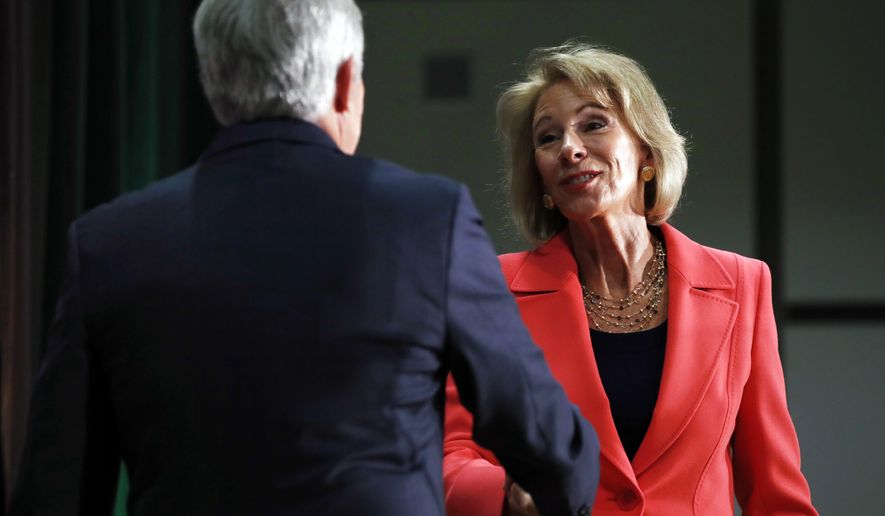Education Secretary Betsy DeVos announced Thursday an initiative to overhaul the Obama administration’s campus sexual assault guidelines, accusing the “shameful” system of failing the accused and the accuser by creating “kangaroo courts.”
Mrs. DeVos said she would issue a public notice aimed at reforming the regulatory framework created by the department’s Office for Civil Rights in its 2011 Title IX guidance, which compels universities to take a harder line on campus sexual assault or face a federal civil rights investigation.
“This unraveling of justice is shameful, it is wholly un-American, and it is anathema to the system of self-governance to which our founders pledged their lives over 240 years ago,” she said in a speech at George Mason University’s Antonin Scalia Law School in Arlington, Virginia. “There must be a better way forward.”
Mrs. DeVos said the Obama administration “weaponized the Office for Civil Rights to work against schools and against students,” producing a system in which “unelected and unaccountable political appointees” have ruled from their desks by sending letters to universities.
“The era of ’rule by letter’ is over,” she said. “Through intimidation and coercion, the failed system has clearly pushed schools to overreach.”
At the same time, Mrs. DeVos stopped short of withdrawing the guidance, saying she wants to gather feedback before issuing updated regulations.
Her comments had been highly anticipated by universities and critics who have accused her of trying to roll back protections for students victimized by sexual assault and harassment on campus.
“Don’t be duped by today’s announcement. What seems merely procedural is a blunt attack on survivors of sexual assault. It will discourage schools from taking steps to comply with the law — just at the moment when they are finally working to get it right,” Fatima Goss Graves, president and CEO of the National Women’s Law Center, said in a statement.
Sen. Kirsten E. Gillibrand, New York Democrat, said the announcement “betrays our students, plain and simple.”
“I don’t want to see an innocent person punished any more than I want to see a guilty person let off the hook, but Secretary DeVos has shown that she does not take the rights of survivors seriously,” Ms. Gillibrand said in a statement.
Hans Bader, senior attorney at the free market Competitive Enterprise Institute, applauded the move, saying Mrs. DeVos was “right to question the Obama administration’s demands on colleges.”
“The Obama administration thumbed its nose at federal court rulings in how it defined constitutionally protected speech as sexual harassment,” Mr. Bader said. “And it pressured colleges to violate state law and discard traditional safeguards for wrongly accused people.”
Others have argued that the Obama-era guidance has created a “witch hunt” atmosphere on campus in which students accused of sexual assault or harassment are assumed guilty and denied basic due process rights, such as being afforded representation or having access to all the evidence against them.
The guidance also has come under fire for its provision requiring universities to use the lower “preponderance of the evidence” standard in determining the guilt of the accused rather than the “beyond a reasonable doubt” standard used in criminal proceedings.
“The right to appeal may or may not be available to either party. And no one is permitted to talk about what went on behind closed doors,” said Mrs. DeVos. “It’s no wonder so many call these proceedings kangaroo courts.”
Mrs. DeVos recounted emotional examples of students who were suspended or expelled despite flimsy evidence against them, leading at least one young man to attempt suicide after being kicked off campus three weeks before graduation without being told why.
She also expressed sympathy for victims, pointing to a student who was told to prosecute her own case and declaring that “acts of sexual misconduct are reprehensible, disgusting and unacceptable.”
“We know this much to be true: One rape is one too many. One assault is one too many. One aggressive act of harassment is one too many,” said Mrs. DeVos. “One person denied due process is one too many.”
Families Advocating for Campus Equality said that at least 73 students filed lawsuits against their colleges as of June 2015 claiming they were found guilty of sexual assault by campus tribunals despite false accusations.
Critics have argued that universities are often unequipped to act as judge and jury in cases of sexual assault.
“This failed system has generated hundreds upon hundreds of cases in the Department’s Office for Civil Rights, mostly filed by students who reported sexual misconduct and believe their schools let them down,” Mrs. DeVos said. “It has also generated dozens upon dozens of lawsuits filed in courts across the land by students punished for sexual misconduct who also believe their schools let them down.”
Mrs. DeVos said universities have been placed in impossible situations by being forced to use the lower “preponderance” standard instead of the “beyond a reasonable doubt” standard required by the judicial system in criminal proceedings.
“Unfortunately, school administrators tell me it has run amok. The Office for Civil Rights has ’terrified’ schools, one said. Another said that no school feels comfortable calling the department for simple advice for fear of putting themselves on the radar and inviting an investigation,” the education secretary said.
The stakes are high, both for the students involved as well as for universities, which risk losing federal funding if they run afoul of the department.
“A system is not fair when the only students who can navigate it are those whose families can afford to buy good lawyers — or any lawyer at all,” she said. “No school or university should deprive any student of his or her ability to pursue their education because the school fears shaming by — or loss of funding from — Washington.”
• Valerie Richardson can be reached at vrichardson@washingtontimes.com.




Please read our comment policy before commenting.